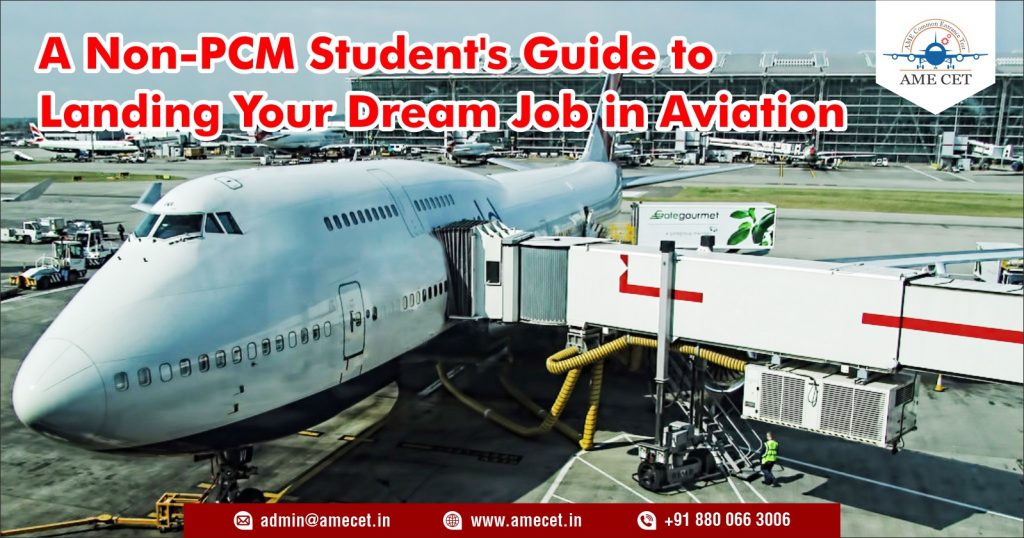A Non-PCM Student’s Guide to Landing Your Dream Job in Aviation
Posted on : 16 March, 2023 4:28 pm
Aviation is an exciting and rewarding field, offering a wide range of career opportunities for individuals with diverse educational backgrounds. While it’s commonly believed that a background in PCM (Physics, Chemistry, and Mathematics) is a requirement for a career in aviation, non-PCM students can also make it big in this field. In this guide, we will explore various paths for non-PCM students to pursue a career in aviation and provide tips for landing your dream job.
Identify your interests and strengths:
The first step in pursuing a career in aviation is to identify your interests and strengths. There are a wide variety of roles in the aviation industry, ranging from pilots, air traffic controllers, mechanics, and airport management. Determine which field interests you the most and which of your skills and strengths would make you a good fit for that role.
Steps to Pursue Aviation Courses with Non-PCM Subjects
Research educational requirements:
Once you have identified the field you want to pursue, research the educational requirements for that role. While PCM is an essential subject for some aviation careers, such as becoming a pilot, other fields like airport management and ground handling do not require a PCM background. Look for courses or programs that cater to your interests and educational background.
Get hands-on experience:
Aviation employers often value practical experience and hands-on training, so it’s essential to gain experience in the field. Look for internships or apprenticeships in your chosen field to gain valuable experience and develop practical skills.
Build your network:
Networking is crucial in the aviation industry, as it can help you make valuable connections that may lead to job opportunities. Attend career fairs, industry events, and connect with professionals on LinkedIn to build your network.
Polish your communication skills:
Good communication skills are essential in the aviation industry, as many roles involve communication with pilots, passengers, and other professionals. Work on developing your verbal and written communication skills to demonstrate your proficiency in this area.
Stay up-to-date with industry trends:
The aviation industry is constantly evolving, so it’s essential to stay up-to-date with industry trends and advancements. Follow industry publications, attend conferences, and network with professionals to stay informed about the latest developments.
Be prepared for the job search:
Prepare a professional resume, cover letter, and portfolio that showcase your skills and experience. Be prepared to answer common interview questions and demonstrate your knowledge of the aviation industry.
Show passion and enthusiasm:
Finally, show passion and enthusiasm for the aviation industry during the job search and interview process. Employers want to hire people who are passionate about their work and are committed to the industry’s success.
Courses Offered for Non PCM Candidate
There are various aviation-related courses offered for non-PCM (Physics, Chemistry, Mathematics) candidates that do not require a strong background in science or engineering. Here are some examples:
- Cabin Crew Training: This course focuses on training individuals for cabin crew positions in airlines. It includes topics such as customer service, safety and emergency procedures, and hospitality.
- Airport Ground Staff Training: This course trains individuals for ground staff positions in airports. It includes topics such as airport operations, passenger handling, and communication skills.
- Airline Ticketing and Reservation Course: This course trains individuals for airline ticketing and reservation jobs. It includes topics such as airline ticketing, fare calculation, and reservation systems.
- Aviation Management Course: This course is designed for individuals who want to pursue a career in aviation management. It covers topics such as airline operations, airport management, and aviation safety.
- *B.Tech in Aerospace Engineering: This course covers topics such as aerodynamics, aircraft structures, propulsion systems, and avionics. It is a 4-year undergraduate program that prepares students for careers in aerospace engineering.
- *B.Tech in Aeronautical Engineering: This course covers topics such as aircraft design, flight mechanics, and aircraft propulsion systems. It is a 4-year undergraduate program that prepares students for careers in aeronautical engineering.
- BBA in Airport Management: This course covers topics such as airport operations, aviation safety, and security management. It is a 3-year undergraduate program that prepares students for careers in airport management.
Note: *Only applicable in some colleges in India
Job Option For Non- PCM Candidate
There are various job options available in the aviation industry for non-PCM candidates. Here are some examples:
- Cabin Crew: Cabin crew members are responsible for ensuring the safety and comfort of passengers during flights. They provide customer service, assist with emergency procedures, and ensure compliance with safety regulations.
- Airport Ground Staff: Airport ground staff members are responsible for various roles in airport operations such as check-in, baggage handling, and passenger assistance.
- Airline Ticketing and Reservation Agent: Airline ticketing and reservation agents are responsible for booking flights, issuing tickets, and providing information to customers.
- Aviation Management: Aviation management professionals are responsible for managing and overseeing various aspects of aviation operations, such as airline operations, airport management, and aviation safety.
- Aviation Sales and Marketing: Aviation sales and marketing professionals are responsible for promoting and selling aviation-related products and services, such as airline tickets, vacation packages, and cargo services.
Conclusion
In conclusion, landing a dream job in aviation as a non-PCM student is not impossible, but it requires a significant amount of hard work, dedication, and persistence. It is essential to explore various career options, gain relevant skills and experience, and network with professionals in the industry. Additionally, developing a strong work ethic, being adaptable, and continuously learning are crucial for success in the aviation industry. With the right mindset and approach, non-PCM students can achieve their career goals and excel in the aviation industry.

